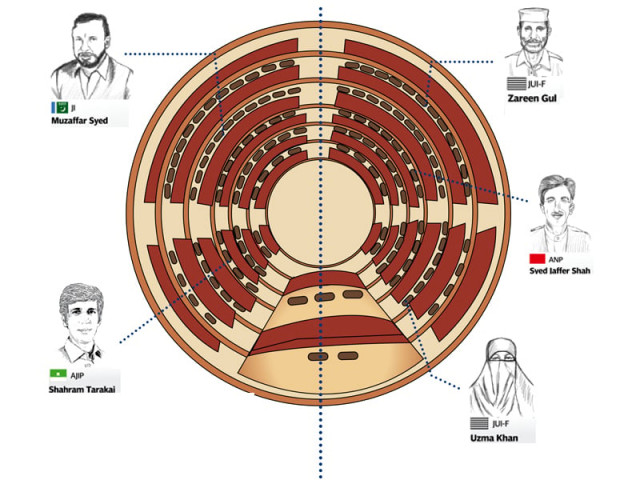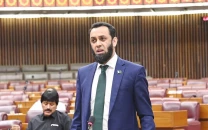K-P Assembly: Who is the most vocal of them all?
After the first parliamentary year, a look at how active opposition and treasury bench members were in K-P Assembly.

After nearly completing the first parliamentary year, we take a look at how active opposition and treasury bench members were in the K-P Assembly. DESIGN: MUNIRA ABBAS, TALHA KHAN
In its first parliamentary year, the Khyber-Pakhtunkhwa (K-P) Assembly passed at least 30 bills in 12 sessions, spread over 103 days. Details of legislative and non-legislative business were taken from the assembly’s website.
Important legislation passed during the first year includes the Local Government Act 2013, K-P Right to Information Act 2013, K-P Ehtesab Commission Act 2013, K-P Medical Transplantation Authority Regulatory Act and K-P Public-Private Partnership Act.
The K-P Assembly started its first parliamentary year on May 28, when its newly-elected members took oath.

On non-legislative business, the house took up 18 privilege motions, 73 calling attention notices and passed 30 resolutions. Assembly Speaker Asad Qaiser shared on May 13 that the house had received 1,874 questions of which 274 were entertained.
With the opposition benches on the offensive, treasury members were kept on their toes with four requisitioned sessions. Eight sessions were called by the treasury. This is how the sparring sides fared when it came to actual business.

All matters non-legislative
Jamiat Ulema-e-Islam-Fazl (JUI-F) MPA from Torghar, Zareen Gul, the most active member, asked the most number of questions on the floor of the house. Gul who is known for his grasp on minor details and finer points had asked around 34 questions up to April 18. He also moved three resolutions, undertaking 37 non-legislative activities.
Gul is closely followed by Awami National Party’s (ANP) lawmaker from Swat, Syed Jaffer Shah. Shah submitted 15 questions, 12 attention notices, four resolutions as well as a privilege motion.
JUI-F’s Mutfi Fazal Ghafoor from Buner and Mufti Syed Janan from Hangu jointly bagged third place in terms of non-legislative activity. Ghafoor asked 12 questions, eight attention notices and a privilege motion while Janan moved 15 questions, a privilege motion, two adjournment motions, a resolution and two calling attention notices.
ANP parliamentary leader Sardar Hussain Babak, Pakistan Muslim League-Nawaz’s (PML-N) Sardar Aurangzeb Naoltha and JUI-F’s Uzma Khan followed with the fourth highest number of non-legislative activity.

Babak had 14 questions, four resolutions and one attention notice. Also with 19 matters of business, Uzma remained the most active lawmaker among the women. Uzma asked seven questions, submitted a privilege motion, two adjournment motions, five resolutions and four attention notices.
Other active opposition members include ANP’s Gohar Ali Shah Bacha, and PML-N’s Arbab Akbar Hayat and Abdul Karim Khan.
Among women
PPP’s Nighat Orakzai and JUI-F MPA Najma Shaheen stand together amongst the women. Orakzai, who has a reputation for being a vocal lawmaker, moved eight resolutions on her own and with other members. She also submitted one adjournment motion and one attention notice. Shaheen submitted nine questions and a calling attention notice.
The government
Treasury lawmakers remained on the quieter side with Muzaffar Syed of the Jamaat-e-Islami (JI) from Lower Dir leading the pack. Syed raised 10 matters of business – a question, a privilege motion, an adjournment motion, three resolutions and four calling attention notices.
In terms of non-legislative business, JI’s Malik Behram and Mohammad Ali and Minister for Health Shahram Khan Tarakai of Awami Jamhoori Ittehad Pakistan were the more active parliamentarians across the aisle.

Among women parliamentarians of PTI, Nagina Khan is the most active lawmaker with a resolution and a calling attention notice, while Zareen Raiz and Bibi Fozia both moved a resolution.
The silent type
Seven female PTI lawmakers did not engage in any kind of non-legislative business throughout the parliamentary year. Four female lawmakers from the opposition also did not engage in such matters.
At least 36 men from both sides of the aisle did not partake in any such business either.
Calling for the bill
Qaiser shared the assembly had received a total 36 ordinances and bills from the government. Of these, 28 bills were passed. One remains under consideration with a select committee.
Twelve private member bills were introduced – two of these were passed, while the government did not allow eight bills to go through. One private member bill was withdrawn while another is still under consideration.
Both of the private member bills which passed were moved by JI’s Syed – The Khyber-Pakhtunkhwa Tibb and Homeopathic Employees (Regulation Services) Bill, 2014 and K-P Regularisation of Services of Ad hoc Lecturers Bill, 2014.
Published in The Express Tribune, May 24th, 2014.



















COMMENTS
Comments are moderated and generally will be posted if they are on-topic and not abusive.
For more information, please see our Comments FAQ